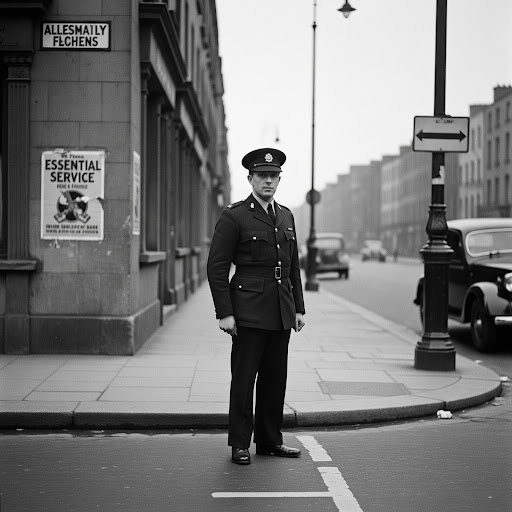The Garda Síochána played a pivotal role during “The Emergency” – Ireland’s term for World War II – when the country maintained a precarious neutrality amidst global conflict. As both an enforcer of neutrality and a security force during uncertain times, the Garda’s responsibilities expanded dramatically during this period.
Background: Ireland’s Neutrality
When war broke out in September 1939, Taoiseach Éamon de Valera immediately declared Ireland’s neutrality. This decision, while controversial internationally, was seen domestically as an assertion of sovereignty for the young Irish state. The Garda Síochána, established just 17 years earlier in 1922, would become instrumental in maintaining this neutral stance.
Expanded Responsibilities
The Emergency Powers Act of 1939 granted unprecedented authority to the government and, by extension, to the Garda. Their duties expanded to include:
- Censorship enforcement: Monitoring publications, films, and eventually mail for content that might compromise neutrality or reveal military information
- Coastal watch: Patrolling Ireland’s extensive coastline to detect any violations of territorial waters
- Alien registration: Monitoring foreign nationals residing in Ireland, particularly those from belligerent nations
- Counter-espionage: Working alongside G2 (military intelligence) to identify potential spies
- Rationing enforcement: Policing the distribution of scarce resources and preventing black market activities
The G-Men of Neutral Ireland
The Garda Special Branch took on particular importance during this period. With limited resources and manpower, these officers had to monitor the activities of both Axis and Allied agents operating on Irish soil. German and British intelligence services both maintained networks in Ireland, creating a complex environment for counterintelligence work.
Notable cases included the arrest of Hermann Görtz, a German spy who parachuted into Ireland in 1940. Gardaí eventually apprehended him in 1941, though he would remain in Irish custody rather than being handed over to the Allies.
Balancing Act: Enforcing Neutrality
Perhaps the most delicate aspect of Garda operations during the Emergency was maintaining the appearance of strict impartiality. When Allied airmen crash-landed in Ireland, they were officially interned at the Curragh Camp. However, there are well-documented cases of Gardaí “looking the other way” as these airmen made their way to the Northern Ireland border.
Conversely, German airmen received similar treatment, though their chances of reaching friendly territory were significantly lower. This “balanced” approach reflected Ireland’s official stance while subtly acknowledging the reality of her geographic and cultural ties to Britain.
Internal Security Concerns
The IRA represented another significant challenge for the Garda during this period. The organisation’s “S-Plan” bombing campaign in England and attempts to establish contact with Nazi Germany were viewed as direct threats to Irish neutrality. The Emergency Powers Act gave Gardaí expanded authority to arrest and detain IRA members without trial.
Between 1939 and 1945, thousands of republicans were interned at the Curragh, with Garda officers conducting raids, surveillance, and arrests throughout the country. This campaign effectively neutralised the IRA as a significant threat during the war years.
Legacy and Lessons
The Emergency period represents a distinctive chapter in Garda history. Operating with limited resources in a time of international crisis, the force demonstrated remarkable adaptability. The experience gained in counterintelligence and security operations would prove valuable in the post-war years.
Moreover, the Garda’s role in maintaining Ireland’s neutrality – however imperfect that neutrality might have been in practice – helped establish the force’s reputation as defenders of Irish sovereignty. The challenges faced during these years strengthened the institutional capacity of the Garda and contributed to its development as a modern police force.
As we reflect on this complex period, we can appreciate how the Garda Síochána navigated the treacherous waters of wartime policing while maintaining their core mission of protecting the Irish state and its people.
Written by Sean Daly Garda

